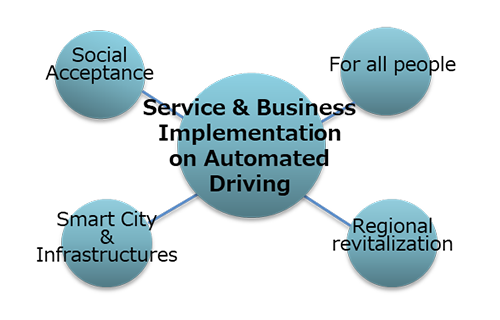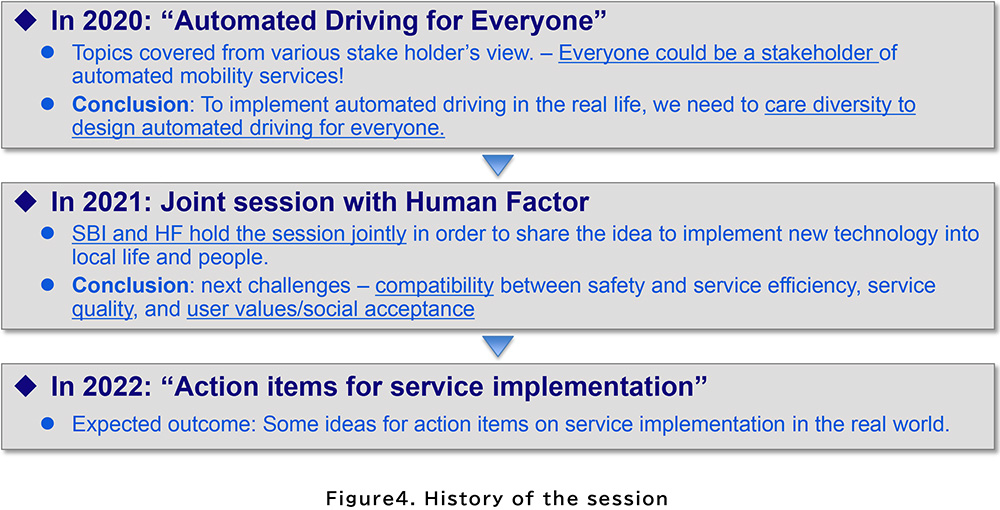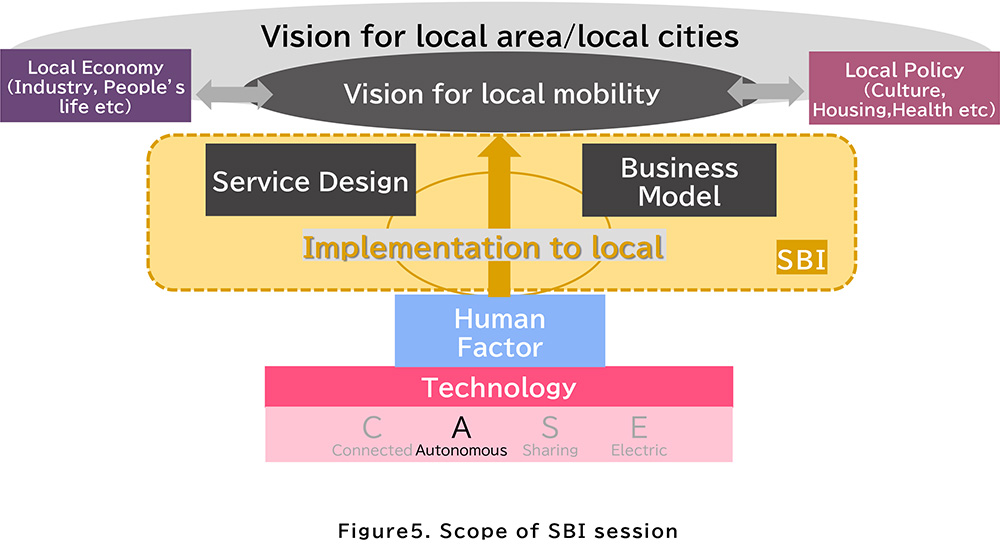Service and Business Implementation
Research Background
These days, not only field operational testings(FOTs) but also social implementation on automated driving, especially on passenger services(such as buses, shuttles) are carrying out all over the world. Thus, research topics on the social implementation of passenger services which utilize automated driving technology into real world are important for the realization of automated driving.
Although many FOTs have been conducted in Japan and overseas, the discussion that arise when stepping up from tests to implementation and evaluate that measures the impact and benefit are still the under studied around the world.
We are moving to the new stage where we need to discuss how we implement automated services into local fields with consideration of local vision, local policy, and local economy.
Therefore, SBI topic have been exchanging information on the implementation of automated driving in other countries from the perspective of promoting service and business implementation.
-
Project Outline
-
Motivation for SBI
What we SBI are always motivated is under the aknowledge of “Automated Driving for Everyone”.

Everyone could be a driver, passenger of the automated driving vehicle, and a citizen of the city where the automated driving services are operated. In order to implement automated driving in the real life, we need to care the diversity to design automated driving for everyone.
Approach 1) Service chain-based assessment for acceptance and risk
The acceptance for the new technologies varied by person.
Consider the risks along with the trip service-chain, both from passenger and driver aspect.
Then, think the solution to overcome the risks and encourage acceptance by technology efforts, legal effort, service design effort, and branding effort.
Approach 2) Who pays how?
The business model for the automated driving is still the big challenge to be discussed – around the world.
We should see the real benefit of automated driving and see who can pay the real benefit for the cost.
-
Project members
-
Theme Leader
Yurie Toyama, Researcher, Mitsubishi Research Institute(2020.11~)
Masayuki Kawamoto, (Then) Professor of Tsukuba University as “Next Generation Transport Theme Leader”(~2020.11) -
International Cooperation
SIP-adus Workshop
Every year since 2016 this research topic had its plenary session and breakout session with international speakers.
Last three years the session has hold with a vision that the SBI topic should minimize the gap between technology and real life, such as local economy, policy and local life. In 2021 SBI hold a joint session with Human Factors.

-
Reference:
2022)https://en.sip-adus.go.jp/evt/workshop2022/
2021)https://en.sip-adus.go.jp/evt/workshop2021/
2020)https://en.sip-adus.go.jp/evt/workshop2020/
2019)https://en.sip-adus.go.jp/evt/workshop2019/ as FOTs and Next Generation Transport
2018)https://en.sip-adus.go.jp/evt/workshop2018/ as Next Generation Transport
2017)https://en.sip-adus.go.jp/evt/workshop2017/ as Next Generation Transport
2016)https://en.sip-adus.go.jp/evt/workshop2016/ as Next Generation Transport
-
International Cooperation
-
Discussion and Perspective beyond SIP-adus 2nd term
Business Model
- Public transportation is not profitable so why agency earn money from other area
- Provide Value proposition
- Cost/Hour, Ridership Target and Planning of service level: frequency, price, punctuality, operating hours
- What is the benefit of automation from passenger’s view
- Passengers are not only the patrons for automated mobility services
- Attractiveness of the area and route
- Open to new technology
- Prioritize on the road to increase share mobility and quality of service
Related SIP Projects
https://en.sip-adus.go.jp/rd/rddata/rd05/e104s.pdf -
Public Acceptance
- Sharing information and sharing the goal
- Raising “Civic Pride” by branding and marketing
- Vehicle Design, Project Design/Logo, Media, SNS policy
- How to evaluate the acceptance is not yet clear
- Local engagement
- Talk with right people to be involved
- Education program of technology and maintenance, Vehicle interaction
- Sharing experiences with children and students

